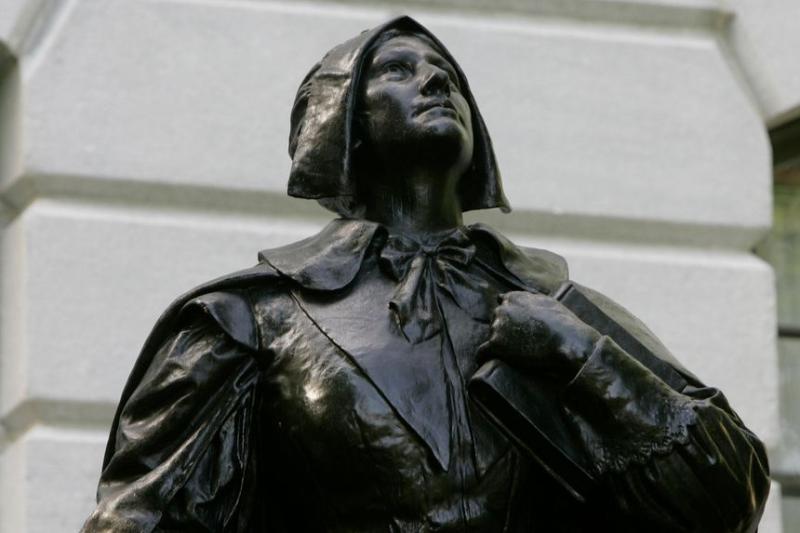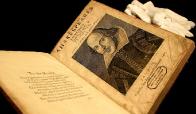'The Passion of Anne Hutchinson' Review: Prophet or Jezebel?
By: Marc M. Arkin (WSJ)



How did a dispute within a small breakaway group of Protestants over a seemingly obscure point of theology become an iconic episode in American history? The issue was whether one could earn eternal salvation through godly behavior, or whether the gift of saving grace is bestowed without regard to a person's conduct. To the side led by Anne Hutchinson, the difference was between a popish "covenant of works" and a true "covenant of grace." To the other, headed by John Winthrop, "free grace" portended "antinomianism," a world of free love and social disorder in which the laws of church and state did not apply to true believers.
The protagonists, as Marilyn J. Westerkamp shows in "The Passion of Anne Hutchinson" (Oxford, 312 pages, $29.95), were worthy adversaries. Winthrop, the leader of the Great Puritan Migration to Massachusetts Bay, was the colony's frequent governor and the man whose vision of a "city upon a hill" became the stuff of presidential speeches. Hutchinson (1591-1643), the daughter of a dissenting minister, was a charismatic matron with a reputation for piety. Caught in the middle was the Rev. John Cotton, a Cambridge-educated divine with a foot in each camp. Resonating through the centuries, the controversy plays out in the parties' own voices in diaries and trial transcripts.
Hutchinson herself speaks to the modern interest in women's history. Called by the scholar Michael Winship "the most famous—or infamous—English woman in colonial American history," she has been cast as a martyr for religious freedom, a victim of the patriarchy, or a sacrifice to social order at a time when Massachusetts was threatened by belligerent Native Americans and a hostile Crown. She was a prophet, a Jezebel or both.
Hutchinson arrived in Boston, age 43, in September 1634, on board the same ship that a year earlier had brought her adored pastor, John Cotton, to the New World. Accompanying her was her husband, William, a successful cloth merchant, 10 of their 11 surviving children, and a handful of relatives and servants. The Hutchinsons joined their eldest son, who had already crossed the Atlantic with Cotton. Among the wealthiest emigres, they received a house lot across the street from Winthrop, grazing rights on Taylor's Island in the middle of Boston Harbor, and 600 acres of farmland near what later became Quincy. William soon became a town selectman and a member of the General Court. Anne became a sought-after midwife and herbalist, known for edifying religious counsel in the birthing room.
By 1636, Anne was holding weekly prayer meetings for women in her home. At first, the gatherings followed the English custom of female "conventicles," but as Anne's fame spread her constituency broadened to include men. Eventually Hutchinson presided over two "public lectures" each week, attended by 60 to 80 followers. Her message—an increasingly strident condemnation of all the local clergy except Cotton—only exacerbated her challenge to the standing order.
In October, the colony’s embattled ministers held a private session with Cotton, Hutchinson and her newly arrived brother-in-law, the Rev. John Wheelwright. Cotton was conciliatory; the other two less so. While conceding that “sanctification,” or good behavior, might be evidence of salvation, Hutchinson and Wheelwright added a new point of contention, asserting that “the person of the Holy Ghost” dwelled within the justified believer. The “indwelling spirit” had been a byword for anarchy since the Reformation. It was exactly what Winthrop and the other institutionalists feared, and they swung into action. Over the next year, Winthrop was swept back into office, Cotton walked the fine line between supporting Hutchinson and placating his fellow clergy, and Wheelwright was banished for seditious contempt of authority. Then, in November 1637, Hutchinson was tried before the civil magistrates for troubling the peace of the commonwealth and its churches.
The trial lasted two days and Hutchinson clearly had the better of it, parrying wits and biblical knowledge with the colony’s best. Then, at the end of the second day, Hutchinson upended the proceedings when she proclaimed that her understanding of grace had come “by an immediate revelation.” (Scholars have long debated why she handed victory to her opponents—was she claiming her prophetic mantle, reassuring her base or suffering from exhaustion? Cotton, to his credit, argued on her behalf that such private revelation was within the Puritan mainstream.) More devastating was the public prophesy that followed: “I fear none but the great Jehovah, which hath foretold me of these things,” she proclaimed. “I know that, for this you go about to do to me, God will ruin you and your posterity and this whole state.”
Hutchinson was convicted and banished from the colony, her departure delayed until she could be excommunicated by her Boston church. In the end, even Cotton renounced her. She moved to Rhode Island but when Massachusetts threatened to annex the region, she and a small group fled to Dutch territory, not far from what is now the Hutchinson River in the northern Bronx. In 1643, all save one child were massacred by the local Native Americans. The leaders of Massachusetts Bay exulted: “The Lord heard our groans to heaven, and freed us from our great and sore affliction . . . this woeful woman.”
In her densely researched book, Ms. Westerkamp, a professor of history at Santa Cruz, offers to place Hutchinson within the context of Puritan spirituality and 17th-century social conventions. It is a strongly feminist reading and one that is profoundly unsympathetic to the colony’s male-dominated leadership. The usually irenic Winthrop emerges as Hutchinson’s “Machiavellian” nemesis. Much ink is spilled on women’s subordination in contemporary domestic-advice manuals. Chapters detail Puritanism’s theology of conversion, the path toward individual salvation, and the feminization of religious metaphor—the believer as spouse of the divine bridegroom—and the threat it posed to the male self-image. Indeed, the author devotes so much attention to context that Hutchinson disappears from extended sections of the book. Ultimately, Ms. Westerkamp draws a straight line from Puritanism’s focus on the believer’s direct relationship with God to Quakerism’s inner light and to the disorderly and threatening women they both empowered—and to the efforts of the Massachusetts standing order to suppress them at all costs. Perhaps it was the patriarchy after all.
Ms. Arkin is a professor at Fordham University School of Law.



